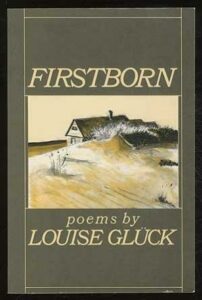I have to confess that I didn’t get a lot of, or get a lot out of, Firstborn, the debut collection of poems from Louise Glück. It was published in 1968, when she was 25. Fifty-two years and a dozen or so collections later, she won the Nobel Prize for Literature. Like my reading of Seamus Heaney, I’m interested in where a lauded poet came from, how she got started, what she was writing at the beginning.
I’m not in terrible company with my reaction to the collection. Glück herself writes, in the Author’s Note to The First Four Books of Poems, “Toward the poems of Firstborn, some written nearly 35 years ago, I try to cultivate an attitude of embarrassed tenderness.” Elsewhere in the same note, she writes, “the idea of revising old work seems odd to me, the spirit animating that work being no longer accessible. Some of the poems, chiefly those in Firstborn, might, in being reconstructed, evaporate.”
That said, a number of the poems in the first section, “The Egg,” are scorpion-shaped. There’s a sting in the end, the last line or two, that whips back at and sometimes into the reader. The first poem, “The Chicago Train,” is like that, as are, for example, “Labor Day” and “Early December in Croton-on-Hudson.” The second section, “The Edge,” brings more character studies and brief sketches. Glück’s first-person narrators in this section are more obviously persons she has observed or imagined, people in various places and times, and particularly people at other stages of life than a somewhat newly married woman in her mid-20s. Whether that’s “Grandmother in the Garden” or “Pictures of the People in the War,” Glück is trying on other lives, working to give readers moments or perspectives from a wider range of folks. Some, though, were completely opaque to me. “Seconds” falls into that category; I can’t tell who’s speaking, who they’re talking to, or, largely, what they’re talking about. Is it a few seconds of domestic violence? Child abuse? Something else entirely? I think the final line is meant to be another scorpion sting, but I don’t know where it’s meant to land. Not every poem is meant to be comprehended; some are meant to be apprehended. In any event, I am not the intended audience for every poem, and it’s fine for some to remain opaque.
The third section, “Cottonmouth Country” turns to places as the second turned to characters. Glück, though, is a nor’easter; real cottonmouth country is mostly beyond her range. “Meridian” neatly captures a languid summer afternoon on Long Island Sound. “The Tree House” catches a geography of memory rather than maps, while “Solstice” pairs place and time, whipping at the end from summer to winter’s icy sting. Glück closes with “Saturnalia,” a vision of Romans and empires ending, with people offering sacrifices for hoped-for future prosperity. Glück’s talent and writing prospered well past this initial collection, and I’m interested to trace more of her path.


1 comment
Hello, my name is Anna Orvin and I am currently analyzing and annotating ‘The Chicago Train’ By Louise Gluck. I was wondering if you could elaborate on what you think the poem is about.
From what I gathered, The Chicago Train is about an adult who witnessed his two parents overdosing in front of him, The story is being told through a dreamlike perspective as if he were a mere witness to his traumatic upbringing.
However I can determine my analysis until I solve one key detail in the poem and that is the line:
And they sat— as though paralysis receding death
Had nailed them there. ——>The track bent south.<—-
I saw her pulsing crotch… the lice rooted in that baby’s hair
I was wondering if you could please elaborate?